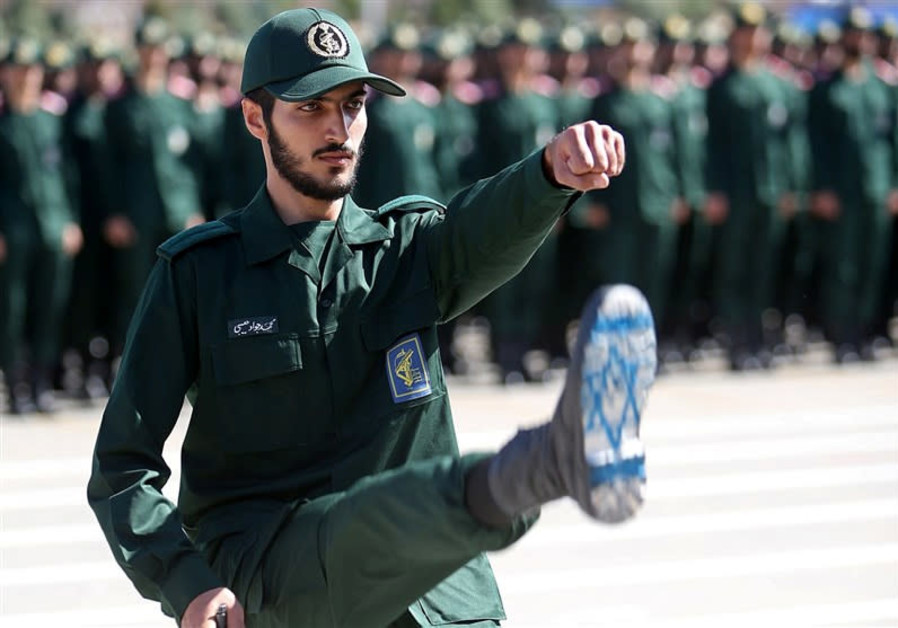Iran showcases new defense cooperation in blow to U.S., Israel

An Iranian Officer of Revolutionary Guards, with Israel flag drawn on his boots, is seen during graduation ceremony, held for the military cadets in a military academy, in Tehran, Iran June 30, 2018. (photo credit: TASNIM NEWS AGENCY/HANDOUT VIA REUTERS)
Iran and Syria signed a deal underlining defense and technical cooperation during a visit by Iranian Defense Minister Amir Hatami to Damascus on Sunday. The deal is meant to “reiterate Tehran’s commitment to Syria’s security,” Iranian state media reported.
Hatami said the new understanding “will define the areas of bilateral presence, participation and cooperation.” Iran indicated that Syria was now entering an era of “reconstruction” and that the war was winding down. Tehran also signaled it would play a key role in rebuilding Syria.
Iran’s Press TV said Hatami’s counterpart, Gen. Ali Abdullah Ayyoub, stressed the importance of not allowing outside countries to “cause damage to the strong and firm relations of the two countries,” a clear jibe aimed at both the US and Israel. In recent months, Washington and Jerusalem have said Iranian forces must be removed from Syria. A US Department of Defense Inspector General report from early August said Iran has 3,000 Islamic Revolutionary Guard Corps members in Syria at 10 military bases and at as many as 40 other positions throughout the country.
Syrian state media also heralded the importance of the visit, a clear sign that both Syria and Iran want to show off their military cooperation and official connections, in light of US pressure for Iran to leave. Iran says it is helping Syria to “fight terrorism” and resist US efforts to “destabilize” the region, a direct response to US claims about Iranian “destabilization” of the Middle East.
Earlier this month, US Secretary of State Mike Pompeo established an Iran Action Group to coordinate US interagency work in confronting Iran’s role in the region. National Security Advisor John Bolton and US Secretary of Defense James Mattis have both emphasized Iran’s regional threats.
The notion that Iran will wind down operations in Syria and that it can be pressured to leave was belied by the current Iranian defense minister’s trip to Syria. Hatami’s visit is only the visible and official side of a much larger network of Iranian influence in Syria that extends to various Iranian-backed militias and the IRGC. Damascus is using the visit to openly court Iran. It also sends a message to Moscow in the wake of Bolton’s claims in Jerusalem that Moscow did not share Iran’s interests in Syria. Hatami referenced 40 years of military cooperation in his discussions, according to Syrian state media.
Details of what the new defense cooperation could mean – including the type of “technology” it involves – remain unclear. Iran recently claimed it unveiled a new warplane, and Iran has continued the development of ballistic missiles. The Iranian message in Damascus seems to be that Iran is determined to stay in Syria.
(function(w,d,s,i){w.ldAdInit=w.ldAdInit||[];w.ldAdInit.push({slot:10834723912266086,size:[0, 0],id:”ld-9628-9059″});if(!d.getElementById(i)){var j=d.createElement(s),p=d.getElementsByTagName(s)[0];j.async=true;j.src=”//cdn2.lockerdomecdn.com/_js/ajs.js”;j.id=i;p.parentNode.insertBefore(j,p);}})(window,document,”script”,”ld-ajs”);
Join Jerusalem Post Premium Plus now for just $5 and upgrade your experience with an ads-free website and exclusive content. Click here>>






Comments are closed.